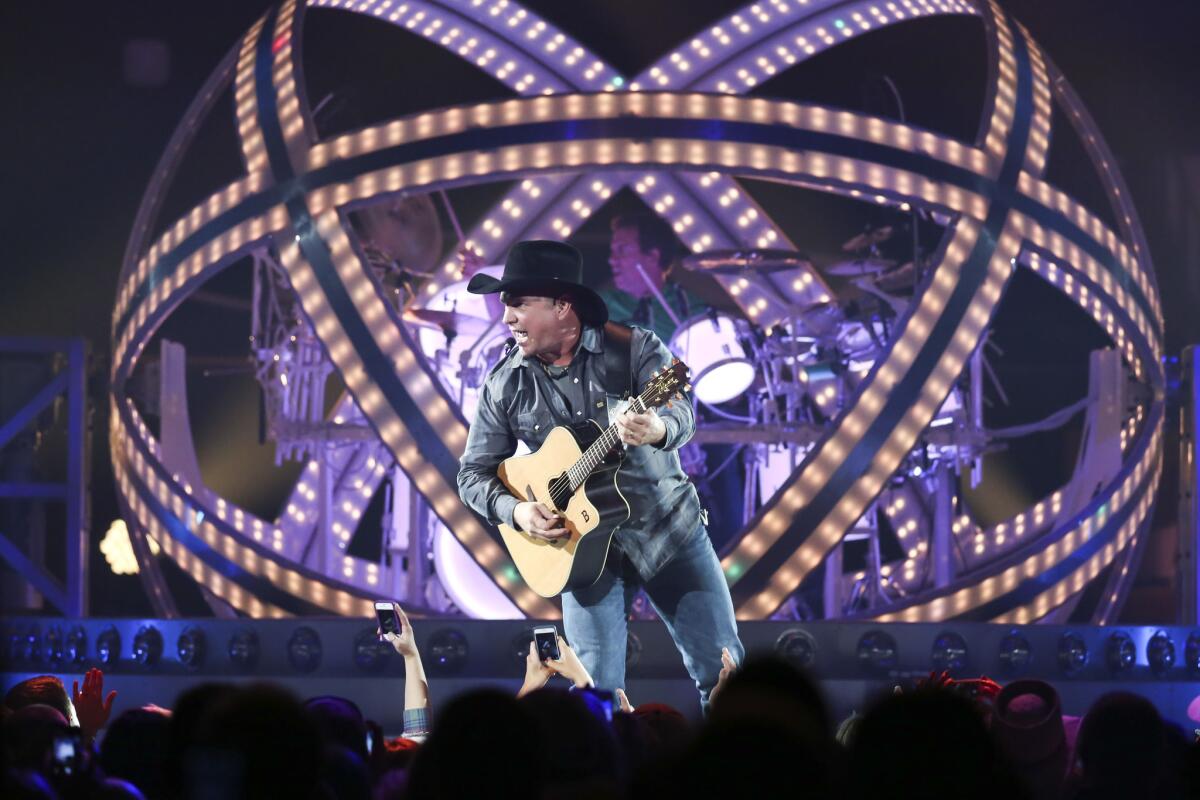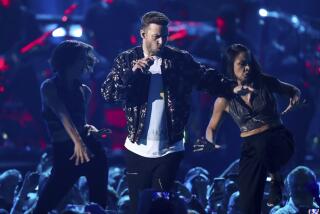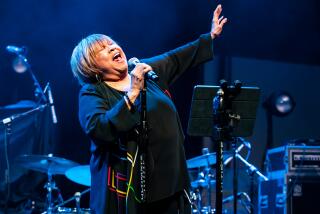Garth Brooks roars back on the music scene with concerts, GhostTunes

Four songs into Garth Brooks’ opening-night show of his first world tour in 17 years, the country superstar screamed at about 17,500 fans packed into the sold-out Allstate Arena outside Chicago. “You came back!” he shouted, then repeated: “You came back!”
“I’ve waited a long, long, long time for this,” he added as fans roared back at him with the force and volume of jet engines at full throttle.
Having laid relatively low since 2001, when he announced that he would devote himself full time to raising his three daughters until all were college-ready, Brooks is reengaging the music world with the enthusiastic energy and maverick sensibility that made him one of the biggest pop music stars of the 1990s.
On Thursday he delivered a physically demanding, emotionally explosive performance just a few hours after he introduced a new business venture, GhostTunes, a digital music service he hopes will give iTunes a run for its money in the ever-evolving realm of download sales and streaming. And while ambitious plans to stage an Elvis-inspired comeback in Ireland were thwarted, the Oklahoma native is being met with arms wide open by fans. Brooks largely sold out 11 shows over seven days at the Allstate Arena in suburban Rosemont, Ill.
“I cried when he retired,” said 33-year-old Chicago lawyer Skip Harsch, who brought his 70-year-old mother, Leslie, to Thursday’s show. “I was just getting old enough where I would be able to go see him in concert. Seeing him tonight was incredible.”
Brooks on Friday morning was munching an apple while curled up in one corner of a gray leather sofa in the backstage dressing room he shares with his wife, singer Trisha Yearwood, who joins him on the tour. “From the neck down, I feel great,” he said.
“I didn’t know how much I missed this. I had no clue how much I missed it.”
Brooks is the top-selling artist in Nielsen SoundScan history, having sold just shy of 70 million albums since SoundScan began tracking retail sales in 1991.
Bringing elements of rock into the more traditionally staid realm of country, Brooks significantly broadened the popularity of the genre in the 1990s. He scored several No. 1 albums on the pop chart, and six albums were awarded “diamond” status by the Recording Industry Assn. of America, indicating U.S. sales of 10 million copies or more.
Brooks’ cross-generational appeal was evident in suburban Chicago. Many parents brought their children and, in some cases, grandchildren to see him.
Kailyn Mann-Caloway, 15, traveled more than 300 miles from Des Moines with her mother, Anessa Mann, and 11-year-old sister, Kiley. Asked how she had been exposed to Brooks’ music, given that she was 2 when he semi-retired, Kailyn said, “From my grandpa. He used to play his CDs.”
The singer hasn’t exactly been out of sight. Las Vegas hotel magnate Steve Wynn persuaded Brooks to do a series of solo, acoustic performances on weekends at his 1,500-seat Encore Theatre in Las Vegas starting in 2009, a stripped-down show that ran for four years. Brooks is also one of the highest-profile musicians who has remained vocal on the digital music landscape.
When it came to his Las Vegas shows, Brooks tried to stay one step ahead of YouTube enthusiasts, preferring to maintain an element of surprise in his shows rather than let there be unfettered access to unauthorized videos. “We’ll keep playing Whac-a-Mole,” Brooks said at a Thursday news conference of his approach to YouTube.
He has also refused to allow his music to be sold on iTunes, citing a reluctance to see his albums diced into bits and pieces by a model that Brooks believes emphasizes individual tracks over albums.
Enter his digital venture GhostTunes.
Brooks says the service “allows artists to sell music any way they want to,” and the new company, of which Brooks is a part owner, launched with more than 7 million albums and singles from a diverse crop of popular artists that includes Iggy Azalea, Coldplay, Kimbra, Ariana Grande, Miranda Lambert, Sia, Eminem, Brad Paisley, Sam Smith and Ed Sheeran.
Brooks himself is leading the GhostTunes assault with a package titled “The Bundle,” which includes all eight of his studio albums and other music for $29.99. Other artists, he said, can choose from among a variety of options, such as selling individual tracks, albums only, streaming only or downloading only.
A lifelong sports enthusiast and former athlete, Brooks acknowledged that GhostTunes appeals to the competitor in him.
“You don’t get into anything without wanting to be the best,” he said Thursday. “There should be more than one major music service. If somebody else decides to do exactly the same thing and we go out of business, then music wins.”
The new tour itself is shaping up as one of the hottest tickets of 2014. After the Rosemont dates, Brooks intends to reveal performances one city at a time. He’ll next play seven shows in Atlanta and has just announced three more shows for Jacksonville, Fla.
It’s further evidence of how Brooks, who earned a bachelor’s in advertising in 1984 from Oklahoma State University, where he returned to pick up an MBA in 2011, has continued to buck conventional industry practices.
He fought for and won ownership of his master recordings from Capitol Records in the 1990s, acting on advice given him on the subject by another country music star with an astute business sense, Buck Owens. With control of his catalog, Brooks was able to create three different CD boxed sets that were initially licensed exclusively to Wal-Mart. They sold for relatively modest prices of less than $30.
But not everything has gone according to plan.
Brooks had designed his splashy return to begin in July with what he billed as the Garth Brooks Comeback Special, a series of five sold-out concerts at the 83,000-capacity Croke Park Stadium in Dublin, Ireland. More than 400,000 tickets were snapped up in January, and Brooks and his team had built an elaborate one-off production for that venue that was to become a TV special, DVD and concert album, which he said he envisioned as his version of Elvis Presley’s famous 1968 NBC comeback special.
Two weeks before the shows were to begin, Dublin’s City Council voted to approve special permits allowing only three of the five planned shows, citing an agreement between the sports association that operates the stadium and residents limiting non-athletic events to three per year.
Brooks said he would play all five of the shows or none. The Dublin officials refused to budge. The concerts were scrapped, costing the city an estimated $68 million in concert-related revenue. Brooks and his promoter, Aiken Productions, came away with a black eye in the minds of many fans who felt there was room to compromise.
“There are things in life you never get over — the death of someone. This is one of those,” Brooks said. “I still don’t know why that happened, and as long as I live, that will hurt. I still keep thinking someone’s going to come along and say, ‘OK, you can do the shows.’”
Brooks grabbed his laptop and pulled up artist renderings of the show that had been designed for Croke Park, a stadium larger than any of those that boast an NFL team.
“It’s Gaelic football, so it’s like two football stadiums side by side, and a third one on the end. People kept saying, ‘Why don’t you just move the concerts?’ This show would not fit into any stadium in the U.S.”
His response throughout the two-week drama was that he refused to be put in the position of deciding which ticket buyers would be allowed to attend and which wouldn’t, saying he’s always strived to treat all fans equally.
That’s also meant no tiered pricing for his concerts, a practice in which the best seats are the most expensive. In the 1990s, tickets were consistently $25, and a decade and a half later they’re going for $68, including all service fees in most venues, for any seat in any of the venues he’s playing.
Asked at the news conference about the comparatively low price of tickets for the new tour, Brooks said, “I don’t care who you are, that’s a lot of money. That’s a lot of money. Nobody goes alone, so you double that. Add in dinner, parking, souvenir T-shirts, and that’s a lot of money. Our job is to make the shows worth it.”
And the early reviews are in.
After the final encore number, as Brooks exited the stage, Natalie Adamec, 32, of Chicago, concluded, “He brought it.” She received a nod of agreement from her friend Ami Garcia, 33. “He brought it.”
More to Read
The biggest entertainment stories
Get our big stories about Hollywood, film, television, music, arts, culture and more right in your inbox as soon as they publish.
You may occasionally receive promotional content from the Los Angeles Times.







